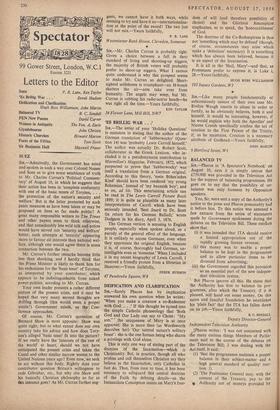Letters to the Editor
Suez P. R. Lane, Ken Taylor 'Es Brillig War . . . ' Derek Hudson
Deification and Clarification Hugh Ross Williamson, John Martin
Balanced TV B. C. Sendall PEN New Poems David Carver Women in Antiquity The Yen. A. Earle Glyndebourne John Christie Historic Churches Howard Marten Poets of the Fifties Tom Scott Sir Benjamin Hall Maxwell Fraser
SUEZ
S1R,—Admittedly, the Government has acted and spoken in such a way over Colonel Nasser and Suez as to give some semblance of truth to Mr. Charles Curran's 'Political Commen- tary' of August 10, in which he suggests that their action has been in 'complete conformity with one of the basic tenets of Toryism, . . . the protection of the nation's security and welfare.' But is the latter protected by such panic measures as have been taken or may be proposed on lines so far made public? A great many responsible writers to The Times and other papers seem to think otherwise, and that considerably less wild talk and action would have served our 'security and welfare' better; such attempts at 'security' appearing more to favour oil interests than national wel- fare, although one would agree there is some connection between the two.
Mr. Curran's further remarks become little less than shocking, and I hardly think that the Prime Minister is likely to thank him for his enthusiasm for the 'basic tenet' of Toryism, as interpreted by your contributor; which appears to be indistinguishable from naked power-politics, acording to Mr. Curran.
Your own leader presents a rather different picture of the present crisis, and it may be hoped that very many second thoughts are drifting through (this would seem a proper simile!) Government minds, as the Con- ference approaches.
Of course, Mr. Curran's quotation of Bernard Shaw is most apposite: Shaw was quite right; but to what extent does our own country take his advice and how does Tory- ism's alleged 'basic tenet' fit into the picture? If we really have the 'interests of the rest of the world' at heart; should we not have anticipated the present crisis and taken the Canal and other similar narrow waters to the United Nations years ago? Even now, we seek to act without this body. Rightly does your contributor question Britain's willingness to cede Gibraltar, etc., but why cite Shaw and his basically Christian philosophy so far as this instance goes? As Mr. Curran further sug- gests, we cannot have it both ways, while seeming to try and have it so—internationalisa- tion at the point of the sword! The two just will not mix.—Yeurs faithfully,
P. R. LANE Westminster Bank House, Clevedon, Somerset


































 Previous page
Previous page